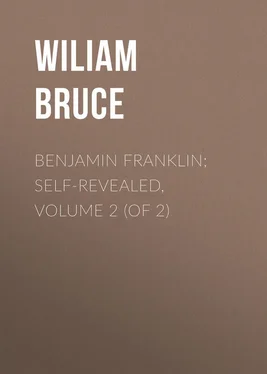Wiliam Bruce - Benjamin Franklin; Self-Revealed, Volume 2 (of 2)
Здесь есть возможность читать онлайн «Wiliam Bruce - Benjamin Franklin; Self-Revealed, Volume 2 (of 2)» — ознакомительный отрывок электронной книги совершенно бесплатно, а после прочтения отрывка купить полную версию. В некоторых случаях можно слушать аудио, скачать через торрент в формате fb2 и присутствует краткое содержание. Жанр: foreign_antique, foreign_prose, на английском языке. Описание произведения, (предисловие) а так же отзывы посетителей доступны на портале библиотеки ЛибКат.
- Название:Benjamin Franklin; Self-Revealed, Volume 2 (of 2)
- Автор:
- Жанр:
- Год:неизвестен
- ISBN:нет данных
- Рейтинг книги:4 / 5. Голосов: 1
-
Избранное:Добавить в избранное
- Отзывы:
-
Ваша оценка:
- 80
- 1
- 2
- 3
- 4
- 5
Benjamin Franklin; Self-Revealed, Volume 2 (of 2): краткое содержание, описание и аннотация
Предлагаем к чтению аннотацию, описание, краткое содержание или предисловие (зависит от того, что написал сам автор книги «Benjamin Franklin; Self-Revealed, Volume 2 (of 2)»). Если вы не нашли необходимую информацию о книге — напишите в комментариях, мы постараемся отыскать её.
Benjamin Franklin; Self-Revealed, Volume 2 (of 2) — читать онлайн ознакомительный отрывок
Ниже представлен текст книги, разбитый по страницам. Система сохранения места последней прочитанной страницы, позволяет с удобством читать онлайн бесплатно книгу «Benjamin Franklin; Self-Revealed, Volume 2 (of 2)», без необходимости каждый раз заново искать на чём Вы остановились. Поставьте закладку, и сможете в любой момент перейти на страницу, на которой закончили чтение.
Интервал:
Закладка:
And no governor was ever so dependent upon the good will of the Assembly. It was during his administration that the Scotch-Irish inhabitants of the frontier, inflamed by Indian outrages, imbrued their hands in the blood of the Conestoga Indians, and, so far from being intimidated by the public proclamations issued by the Governor for their arrest and punishment, marched to the very threshold of Philadelphia itself with the purpose of destroying the Moravian Indians huddled there in terror of their lives. The whole Province outside of the City of Philadelphia was given over to lawlessness and disorder. In the contagious excitement of the hour, a considerable portion of its population even believed that the Quakers had gained the friendship of the Indians by presents, supplied them secretly with arms and ammunition, and engaged them to fall upon and kill the whites on the Pennsylvania frontier. Under these circumstances, the Governor simply did what Governor Morris and Governor Denny had been compelled to do before him, namely, call in the aid of the man who could in a letter to Peter Collinson truthfully sum up all that there was in the military demonstration which angered Thomas Penn so deeply with the simple utterance, "The People happen to love me." The whole story was told by Franklin to Dr. Fothergill in the letter from which we have just quoted.
More wonders! You know that I don't love the Proprietary and that he does not love me. Our totally different tempers forbid it. You might therefore expect that the late new appointments of one of his family would find me ready for opposition. And yet when his nephew arrived, our Governor, I considered government as government, and paid him all respect, gave him on all occasions my best advice, promoted in the Assembly a ready compliance with everything he proposed or recommended, and when those daring rioters, encouraged by general approbation of the populace, treated his proclamation with contempt, I drew my pen in the cause; wrote a pamphlet (that I have sent you) to render the rioters unpopular; promoted an association to support the authority of the Government and defend the Governor by taking arms, signed it first myself, and was followed by several hundreds, who took arms accordingly. The Governor offered me the command of them, but I chose to carry a musket and strengthen his authority by setting an example of obedience to his order. And would you think it, this proprietary Governor did me the honour, in an alarm, to run to my house at midnight, with his counsellors at his heels, for advice, and made it his head-quarters for some time. And within four and twenty hours, your old friend was a common soldier, a counsellor, a kind of dictator, an ambassador to the country mob, and on his returning home, nobody again. All this has happened in a few weeks.
With the retirement of the backwoodsmen from Philadelphia to their homes, sprang up one of the angriest factional contests that Pennsylvania had ever known. Every malignant passion, political or sectarian, that lurked in the Province was excited into the highest degree of morbid life. The Presbyterians, the Churchmen, even some of the Quakers, acclaimed the Paxton Boys as instruments of a just vengeance, and they constituted a political force, which the Governor was swift to utilize for the purpose of strengthening his party. He dropped all efforts to apprehend the murderers of the Conestoga Indians, granted a private audience to the insurgents, and accused the Assembly of disloyalty, and of encroaching upon the prerogatives of the Crown, only because it had been presumptuous enough to make an appointment to a petty office in a bill tendered to him for his assent. It was during his administration, too, that the claim was made that, even if the Proprietary estate had been subjected to taxation by the Lords in Council, under the terms of one of the amendments, proposed by them, " the best and most valuable ," of the Proprietary lands "should be tax'd no higher than the worst and least valuable of the People's."
When the conflict was reopened, the Assembly boldly brought it to an issue. One of its committees, with Franklin at its head, reported a series of resolutions censuring the proprietaries, condemning their rule as too weak to maintain its authority and repress disorder, and petitioning the King to take over the Government of the Province, after such compensation to the Proprietaries as was just. The Assembly then adjourned to sound the temper of their constituents, and their adjournment was the signal for a pamphlet war attended by such a hail of paper pellets as rarely marked any contest so early in the history of the American Colonies. Among the best of them was the pamphlet written by Franklin, and entitled Cool Thoughts on the Present Situation of our Public Affairs , which has already been mentioned, and which denounced in no uncertain terms the "insolent Tribunitial VETO," with which the Proprietaries were in the habit of declaring that nothing should be done, unless their private interests in certain particulars were served.
On May 14, 1764, the Assembly met again, and was soon deeply engaged in a debate as to whether an address should be sent to the King, praying the abolition of the Proprietary Government. Long did the debate last; Joseph Galloway making the principal argument in support of the proposition, and John Dickinson the principal one against it. When the vote was taken, the affirmative prevailed, but, as Isaac Norris, who had been a member of the body for thirty years, and its speaker for fifteen, was about to be bidden by it to sign the address, he stated that, since he did not approve it, and yet would have to sign it as speaker, he hoped that he might have time to draft his objections to it. A short recess ensued, and when the members convened again, Norris sent word that he was too sick to be present, and requested that another person should be chosen as speaker. The choice of the body then fell upon Franklin, who immediately signed the paper.
The next sitting of the Assembly was not to be held until the succeeding October, and before that time the annual election for members of the Assembly was to take place. For the purpose of influencing public opinion, Dickinson, upon its adjournment, published his speech with a long preface by Dr. William Smith. Galloway followed suit by publishing his speech with a long preface by Franklin. This preface is one of Franklin's masterpieces, marked it is true by some quaint conceits and occasional relaxations of energy, but full of power and withering sarcasm. Preceded by such a lengthy and brilliant preface, Galloway must have felt that his speech had little more than the secondary value of an appendix. With the consummate capacity for pellucid statement, which was one of Franklin's most remarkable gifts, it narrated the manner in which the practice of buying legislation from the Proprietaries had been pursued. With equal force and ingenuity, it demonstrated that five out of the six amendments, proposed by the Lords in Council to the Act, approved by Governor Denny, did not justify the charge that the circumstances, in which they originated, involved any real injustice to the Proprietaries, and that the sixth, which forbade the tender to the Proprietaries of paper bills of fluctuating value, in payment of debts payable to them, under the terms of special contracts, in coin, if a measure of justice to them, would be also a measure of justice to other creditors in the same situation, who were not mentioned in the amendment.
Referring to the universal practice in America of making such bills a legal tender and the fact that the bills in question would have been a legal tender as respects the members of the Assembly and their constituents as well as the Proprietaries, Franklin's preface glows like an incandescent furnace in these words:
Читать дальшеИнтервал:
Закладка:
Похожие книги на «Benjamin Franklin; Self-Revealed, Volume 2 (of 2)»
Представляем Вашему вниманию похожие книги на «Benjamin Franklin; Self-Revealed, Volume 2 (of 2)» списком для выбора. Мы отобрали схожую по названию и смыслу литературу в надежде предоставить читателям больше вариантов отыскать новые, интересные, ещё непрочитанные произведения.
Обсуждение, отзывы о книге «Benjamin Franklin; Self-Revealed, Volume 2 (of 2)» и просто собственные мнения читателей. Оставьте ваши комментарии, напишите, что Вы думаете о произведении, его смысле или главных героях. Укажите что конкретно понравилось, а что нет, и почему Вы так считаете.










![Benjamin Franklin - Memoirs of Benjamin Franklin; Written by Himself. [Vol. 2 of 2]](/books/747975/benjamin-franklin-memoirs-of-benjamin-franklin-wr-thumb.webp)
![Benjamin Franklin - Memoirs of Benjamin Franklin; Written by Himself. [Vol. 1 of 2]](/books/748053/benjamin-franklin-memoirs-of-benjamin-franklin-wr-thumb.webp)
